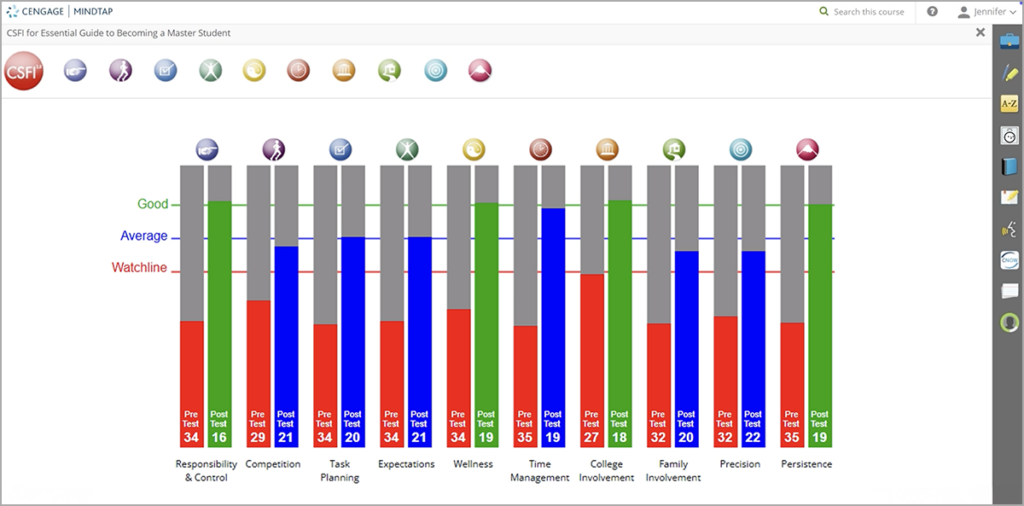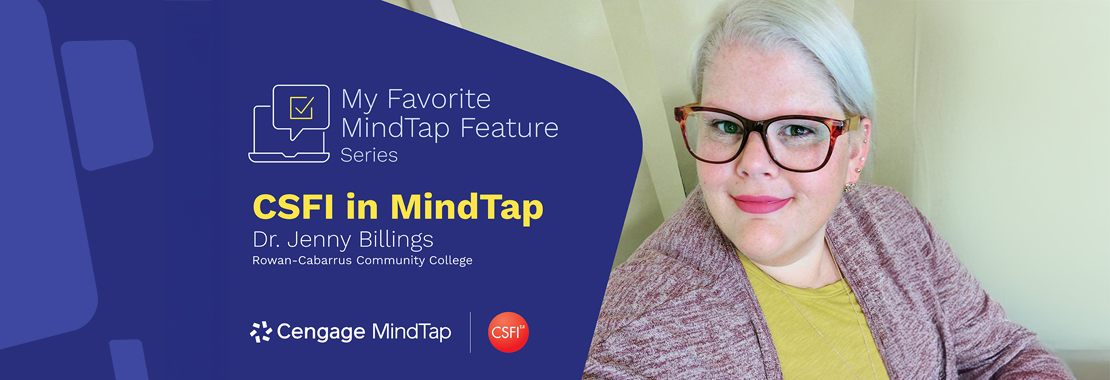As an avid user of Cengage’s MindTap online learning platform for over 10 years, I have tried about every feature it has to offer. Through my role as Chair of English and Study Skills, I am constantly tracking student data and implementing new ways to improve performance measures. In recent years, I have relied heavily on my favorite feature in MindTap, the College Success Factors Index (CSFI). By including it in our study skills courses, I’ve had the privilege of witnessing firsthand the transformative impact it has on student success.
Understanding student pain points
The transition to higher education can be a daunting experience for many students. My “babies,” as I call them, often mention challenges they face that extend beyond academic rigor, encompassing a wide range of factors such as time management, study habits, and emotional well-being. These challenges can significantly impact student success, leading to lower grades, decreased motivation, and even withdrawal from courses or institutions.
The CSFI solution
The CSFI is a comprehensive assessment tool designed to evaluate students’ readiness for academic success. Most student success tools only measure or discuss a student’s academic journey. The CSFI addresses students’ holistic development by examining cognitive, social, and emotional factors that can impact success. Students complete a 100-statement, self-scoring survey that assesses 10 distinct factors:
- College Involvement: Success in college is often defined by the levels and degree of one’s participation with peers and faculty. College involvement also includes being familiar with student organizations, or volunteer work, class research projects, and other college activities.
- Competition: Competition is a student’s need to know, learn and take pride in competition related to academic tasks. Academically assertive students have the internal motivation, resourcefulness, competitive drive, and desire to collaborate with others to succeed in college and the workplace.
- Expectations: To demonstrate thoughtful goals and decision-making processes, coupled with a plan of action for completing class projects and assignments, and attaining career goals.
- Family Involvement: Family/partner encouragement, acceptance, and emotional and financial support are important for college success.
- Persistence: Persistence is the will and energy to complete a task or skill through diligence, practice, and extra effort.
- Precision: Precision is thinking and applying the detailed and repeated measurement of technical, computer, and internet skills for college success.
- Responsibility and Control: Students who take responsibility and control in college succeed. They feel confident and assured regarding their classes, careers, and projects.
- Task Planning: Successful students set goals and complete their assignments in their courses of study. They follow step-by-step study practices within specified periods and take pride in the grades earned.
- Time Management: Time management relates to the development of skills and techniques such as prioritizing events, establishing calendars and schedules. Learning to assign realistic time limits to class assignments, studying, work, family, and social activities lead to effective time management.
- Wellness: Wellness means having positive attitudes and consistent practices of physical, emotional, and stress parameters in one’s college life.
Benefits for students
The CSFI offers a multitude of benefits to students, empowering them to take control of their academic journey:
- Self-Awareness: By completing the CSFI, students gain valuable insights into their strengths and weaknesses. This self-awareness allows them to identify areas where they may need to improve and develop targeted strategies to enhance their skills.
- Personalized Support: Instructors can leverage the CSFI results to provide tailored support and guidance to each student. This personalized approach ensures that students receive the specific help they need to succeed.
- Targeted Interventions: The CSFI can identify students who may be at risk of academic difficulty. By proactively addressing these students’ needs, instructors can prevent potential problems and promote student success. You can even set up early alerts based off this feedback!
- Skill Development: The CSFI can be used to guide students towards resources and activities that can help them develop critical skills such as time management, study habits, and test-taking strategies.
- Resource Connection: Because the CSFI details where students may struggle, you can determine the best resources and connect students to them early on. Doing so can help students improve their CSFI results from pre- to post-test.
- Enhanced Motivation: By setting clear goals and tracking their progress, students can stay motivated and focused on their academic pursuits.
Benefits for administrators
The CSFI is seamlessly integrated into MindTap, making it easy for students to access and complete. Once the CSFI is completed, students gain access to their report immediately and can download it as a PDF. Instructors can download reports for their individual sections. There’s also an administrator link where a report can be pulled for all students across a department, division, or institution. By having access to admin reports, you can provide:
- Personalized Advising: Leverage CSFI assessment results to personalize student advising. During advising sessions, discuss individual strengths, challenges, and goals revealed by the assessment to create tailored academic plans. This includes guidance on course selection, major exploration, and career pathways. Regular follow-up meetings will help students maintain progress and address any new concerns. These reports can help advisors, faculty mentors, program chairs, and enhance any First Year Program.
- Student Success Workshops: Host workshops and seminars informed by CSFI results to address shared student challenges. These sessions can cover topics such as study strategies, goal setting, wellness, financial literacy, and career readiness. Equipping students with these skills and knowledge will contribute to their overall success and well-being. CSFI results can also facilitate the creation of peer support groups by matching students with similar needs and challenges. This is especially important for students who score low in the “Family Involvement” category.
- Faculty Collaboration: Disseminate CSFI results to faculty. This can improve their understanding of student needs and inform the integration of supportive strategies into their teaching practices. This collaboration can create more supportive and engaging classroom environments, promoting student success. The results can also guide professional development offerings, course design, and instructors’ approaches to student learning.
- Continuous Monitoring and Evaluation: Continuously evaluate the effectiveness of CSFI-informed interventions and support programs. Monitor student progress, retention rates, and academic performance to assess the impact of these initiatives. Use this data to drive decision-making and continuously enhance student support and success outcomes. Use the CSFI data to your benefit! It can be used to supplement program data, class statistics, or even shape an institution’s Quality Enhancement Plan (trust me – I know!).

Conclusion
Cengage’s CSFI is a truly innovative feature that has the potential to revolutionize the way we approach student success. By providing valuable insights and personalized support, the CSFI empowers students to overcome challenges, develop essential skills, and achieve their academic goals. As an educator and a student advocate, I wholeheartedly endorse the CSFI as a powerful tool for fostering student success. Sometimes, the first step is just getting students to open and admit what they are struggling with, both in- and outside the classroom. The CSFI as a self-assessment encourages those conversations.
Want to connect? Reach out.
Watch Dr. Billings in “CSFI in MindTap,” part of our “My Favorite MindTap Feature” series.

Explore CSFI helpful videos:
Completing CSFI Assessments (Student)
Reviewing Student Results (Instructor)
Understanding Your Results (Student)
CSFI Administrator Results (Admin)
Written by Dr. Jenny Billings, Chair of ACA (Study Skills), DRE (Developmental Reading and English) and ENG (Curriculum English) at Rowan-Cabarrus Community College in Concord and Salisbury, North Carolina.


